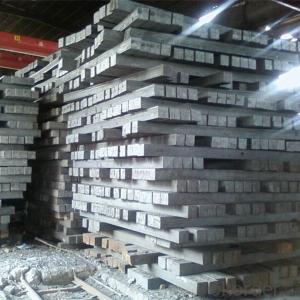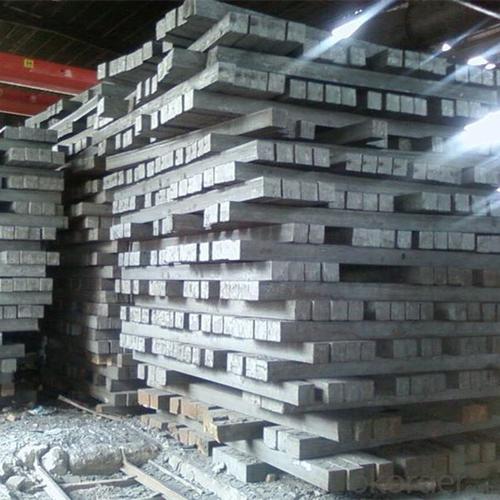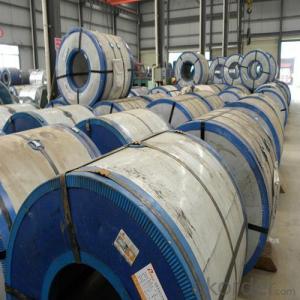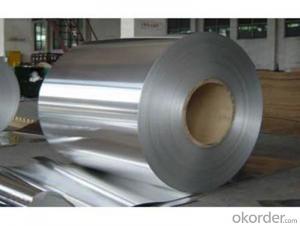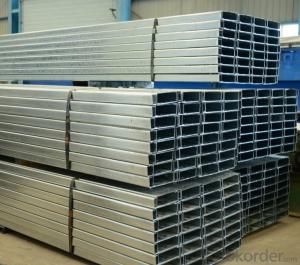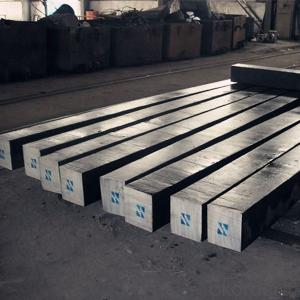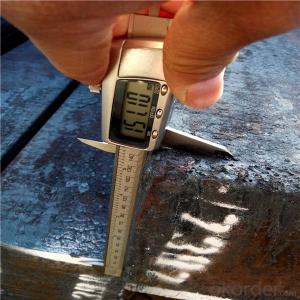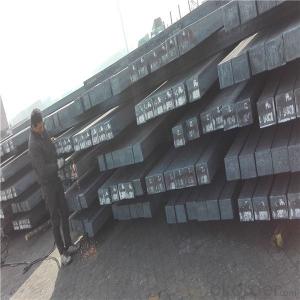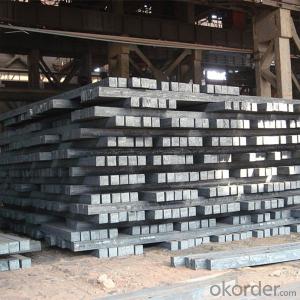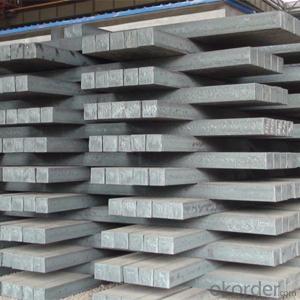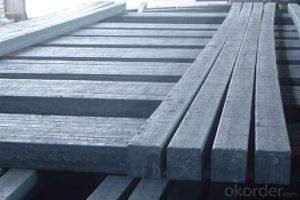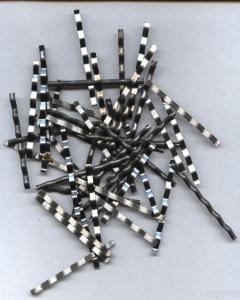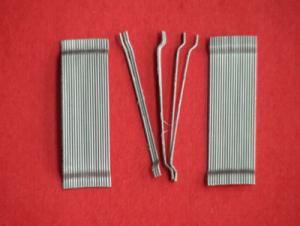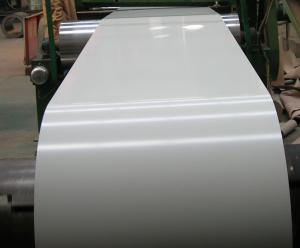Prime Steel Billets From China Tangshan Manufacutrer
- Loading Port:
- China main port
- Payment Terms:
- TT OR LC
- Min Order Qty:
- 1000 m.t.
- Supply Capability:
- 100000 m.t./month
OKorder Service Pledge
OKorder Financial Service
You Might Also Like
Specification
square steel billets 3sp & 5sp grade
Specifications
square steel billets
1)We procure world class quality steel billets which meets the specific requirements of the clients
The Billets produced by the company can be broadly divided into three main types i.e.
1. M.S. Billets
2. CRS Billets
3. Special Alloy Billets
M.S. Billets are used for rolling of TMT Re-Bars of Fe415 and Fe500 Grade and various other structural steel products.
CRS Billets are used fro rolling of CRS TMT Re-Bars.
Special Alloy Billets are used for rolling of any special grade TMT Re-Bars like Earthquake resistant TMT Re-Bars and for special grade structural steel products.
The following are the sizes of Billets available with Shyam Steel Industries Ltd.:
100 X 100
125 X 125
150 X 150
Chemical Analysis: | |||
Grade | Sulphur | Phosphorous | Carbon Equivalent (CE)1 |
Max | Max | Max | |
A | 0.05 | 0.05 | 0.42 |
B | 0.045 | 0.045 | 0.41 |
C | 0.04 | 0.04 | 0.39 |
Chemical Comosition
Standard | C(%) | Mn(%) | S(%) | P(%) | Si(%) |
Q195 | ≤0.12 | ≤0.50 | ≤0.040 | ≤0.035 | ≤0.30 |
Q235 | ≤0.20 | ≤1.40 | ≤0.045 | ≤0.045 | ≤0.35 |
Q275 | ≤0.22 | ≤1.50 | ≤0.045 | ≤0.045 | ≤0.35 |
20MnSi | 0.17-0.25 | 1.2-1.6 | ≤ 0.050 | ≤ 0.050 | 0.40-0.80 |
3SP | 0.14-0.22 | 0.40-0.85 | ≤ 0.050 | ≤ 0.040 | 0.05-0.15 |
5SP | 0.28-0.37 | 0.50-1.00 | ≤ 0.050 | ≤ 0.040 | 0.15-0.30 |
Product image:
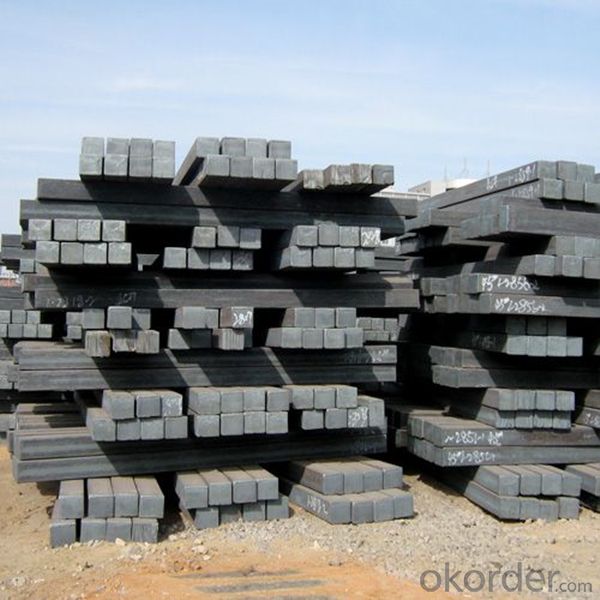
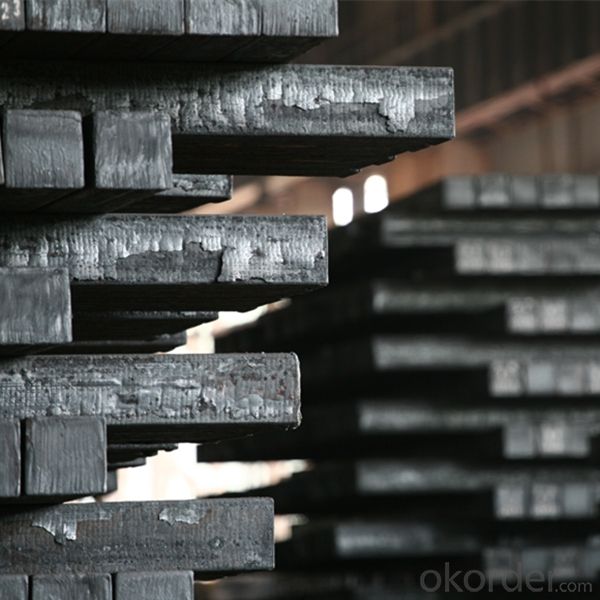
- Q: What are the different types of steel sections used in industrial structures?
- There are several types of steel sections commonly used in industrial structures, including I-beams, H-beams, channels, angles, and T-sections. These sections are chosen based on their structural properties, such as load-bearing capacity and resistance to bending. Each section has its own unique shape and dimensions, allowing for efficient distribution of weight and optimal structural integrity in various applications.
- Q: How is steel sheet metal fabricated?
- Steel sheet metal is fabricated through a process called sheet metal fabrication, which involves cutting, bending, and shaping steel sheets to create various products or components. This can be done using various techniques such as shearing, punching, laser cutting, or plasma cutting to cut the steel sheets into the desired shape. Bending is then carried out using press brakes or other bending tools to give the sheets the required angles and curves. The final step involves assembling or joining the fabricated pieces using welding, riveting, or other joining methods to create the desired steel sheet metal product.
- Q: How is steel used in the production of electrical equipment?
- Steel is commonly used in the production of electrical equipment as it provides a sturdy and durable structure for various components such as enclosures, frames, and supports. It helps protect the sensitive electrical components from external factors, such as impact, vibrations, and environmental conditions, ensuring the equipment's longevity and functionality. Additionally, steel can be easily molded and shaped, making it suitable for creating intricate designs and precise fittings in electrical equipment.
- Q: How is steel rebar threaded for connecting reinforcement bars in construction?
- Steel rebar is threaded for connecting reinforcement bars in construction using a process called threading. This involves cutting precise threads onto the end of the rebar using a specialized machine. The threaded end of one rebar is then inserted into a coupler, which is a device designed to provide a secure connection. The other end of the coupler is threaded as well, and a second rebar is inserted and tightened with a wrench. This threaded connection ensures a strong and reliable bond between the reinforcement bars, enhancing the overall structural integrity of the construction project.
- Q: How are steel products used in the energy sector?
- Steel products are used extensively in the energy sector for various applications such as power generation, transmission, and storage. For example, steel is used in the construction of power plants, including the building of boilers, turbines, and support structures. It is also utilized in the manufacturing of transmission towers, pipelines, and storage tanks for oil, gas, and renewable energy sources. Steel's strength, durability, and corrosion resistance make it a crucial material in ensuring the efficient and reliable functioning of energy infrastructure.
- Q: How is steel used in the production of playground equipment?
- Steel is commonly used in the production of playground equipment due to its strength, durability, and ability to withstand outdoor elements. It is used to construct the frames, supports, and chains of various play structures such as swings, slides, and climbing frames. Steel's robust nature ensures the equipment can safely support the weight of children and withstand frequent use and harsh weather conditions, making it an ideal material for playground equipment.
- Q: How is steel wire mesh used in filtration systems?
- Steel wire mesh is commonly used in filtration systems due to its durability and high tensile strength. It is used as a filter medium to trap solid particles and separate them from liquids or gases. The mesh acts as a barrier, allowing the fluid to pass through while retaining the particles. The various mesh sizes available allow for different levels of filtration, making steel wire mesh an essential component in industries such as water treatment, oil and gas, food processing, and automotive.
- Q: How are steel products tested and certified for quality and performance?
- Steel products are tested and certified for quality and performance through a rigorous process that involves various stages. Initially, the raw materials used for manufacturing the steel are thoroughly inspected to ensure they meet the required specifications. Then, during the production phase, multiple tests are conducted, including tensile and hardness tests, to assess the strength and durability of the steel. Additionally, non-destructive testing methods such as ultrasonic examination and magnetic particle inspection are employed to identify any potential defects or flaws. Finally, the finished steel products undergo quality control measures, where samples are randomly selected and tested to verify their compliance with industry standards and regulations. Once the products successfully pass these tests and meet the necessary criteria, they are certified for quality and performance, ensuring that they meet the required specifications and can perform reliably in their intended applications.
- Q: What are the different types of steel bolts and their uses in the construction of power plants?
- There are several types of steel bolts commonly used in the construction of power plants. The most common ones include structural bolts, anchor bolts, and flange bolts. Structural bolts are used to connect heavy structural members, such as steel beams and columns, to provide stability and support. These bolts are typically high-strength and have a larger diameter to withstand heavy loads and vibrations. Anchor bolts are used to secure equipment and machinery to the concrete foundation in power plants. They are designed to provide stability and prevent movement or shifting of the equipment during operation. Anchor bolts are often embedded in the foundation and have threaded ends to attach nuts and washers. Flange bolts are used to connect piping systems, valves, and flanges in power plants. They have a washer-like flange under the head, which distributes the load and prevents leakage. Flange bolts are available in various grades and sizes, depending on the specific requirements of the application. In summary, the different types of steel bolts used in the construction of power plants serve distinct purposes. Structural bolts provide stability to heavy structural members, anchor bolts secure equipment to the foundation, and flange bolts connect piping systems and prevent leakage.
- Q: What are the different types of steel sheets and their uses in the automotive industry?
- There are several types of steel sheets used in the automotive industry, including hot-rolled, cold-rolled, galvanized, and advanced high-strength steels. Hot-rolled steel sheets are commonly used for structural components, while cold-rolled steel sheets are used for body panels and other aesthetic parts. Galvanized steel sheets provide corrosion resistance and are often used for underbody components. Advanced high-strength steels have superior strength-to-weight ratios and are utilized in safety components like door beams and crash structures. Overall, these different types of steel sheets serve various purposes in the automotive industry, from structural support to safety enhancement.
Send your message to us
Prime Steel Billets From China Tangshan Manufacutrer
- Loading Port:
- China main port
- Payment Terms:
- TT OR LC
- Min Order Qty:
- 1000 m.t.
- Supply Capability:
- 100000 m.t./month
OKorder Service Pledge
OKorder Financial Service
Similar products
Hot products
Hot Searches
Related keywords
